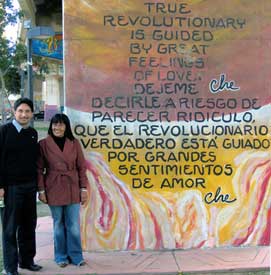Latin American labor tour culminates in Wisconsin
By
Cheryl LaBash
Published Apr 6, 2011 4:20 PM
|
From left, Pipino Cuevas Velasquez and
Gilda Chacon Bravo in San Diego.
WW photo: Bob McCubbin
|
An 11-city national visit of Latin American union leaders culminated on April 1
in Wisconsin, the touchstone of the fight against union busting in the U.S.
Within one day the delegation met with immigrant rights community organizers at
Voces de la Frontera in Milwaukee and young militants in Madison who had
spurred a recent three-week Capitol occupation, and spoke at a public meeting
at Madison’s Labor Temple.
The U.S./Cuba Labor Exchange, Union del Barrio and the International Action
Center initiated the tour, which was also supported by the World Federation of
Trade Unions - Americas Region.
Gilda Chacon Bravo from Cuba represented the WFTU throughout and was joined by
Humberto Montes de Oca Luna and Pipino Cuevas Velasquez from the Mexican
Electrical Workers (SME). The U.S. denied a visa to Mexican teachers’
union leader Jorge Cazares, effectively blocking communication with the active
student and teacher movement in many U.S. cities.
In city after city, the SME leaders told the story of their 44,000 members, who
together with their families were deprived of their livelihood in a night,
forced from their jobs by the police and marines on Oct. 9, 2009. This attack
was part of the neoliberal agenda of Mexican President Felipe Calderon, who
wants unions and any restrictions on capitalist profiteering eliminated and all
regulations “liberalized.”
The tour’s theme, “Workers struggle beyond borders, uniting the
people of nuestra América (our America),” came alive. According to
Wisconsin Gov. Scott Walker, an anti-union law was needed there to provide
“flexibility.” Even President Barack Obama promotes helping
business as the road to ending unemployment and underemployment. It is the same
neoliberal program faced by workers in Mexico and the U.S.
A government slander campaign against SME — a union formed in 1914
— portrayed the union as overpaid and inefficient. The government claimed
utility rates would go down and service would improve without the union. But
when private contractors took over the work at the public Luz y Fuerza del
Centro (Light and Power), inexperienced workers died in accidents, rates
increased by 33 percent and power outages increased in Mexico City, a
megalopolis with 20 million inhabitants.
SME turned this around by uniting with electricity users. Now of every 10
users, only three are paying their inflated electric bills. Working directly
with the community, SME workers solve power outages.
Although many workers took a buyout, essentially selling their right to their
jobs, more than 16,000 workers and their families remain in the struggle, which
includes massive occupations of the central square, hunger strikes and a legal
and electoral strategy. A current permanent “encampment” in the
Zocalo square in Mexico City demands a solution to this conflict and the
freedom of SME leader Miguel Márquez Ríos, who is a political
prisoner.
Alternative to oppression
Latin American countries are constructing an alternative to neoliberalism and
capitalist economic relations that exploit and oppress workers. Cuban leader
Gilda Chacon Bravo, the first WFTU leader to tour the U.S., described how the
Bolivarian Alliance for the Americas (ALBA) has benefited not only the nine
member states but has also helped development throughout Central and South
America and the Caribbean.
Venezuelan President Hugo Chavez proposed ALBA, which Cuba and Venezuela
initiated on Dec. 14, 2004. Since then cooperative trade between nations has
helped meet the needs of the poorest and formerly disenfranchised people.
Operation Milagro restores eyesight to millions. The Cuban-developed “Yo
sí puedo” literacy method teaches adults reading and writing in
three months. The United Nations reports that illiteracy has been eliminated in
Venezuela and Bolivia using this important tool.
Indigenous and Afro-descendant people are formally included in the ALBA
decision-making process. The “sucre” virtual currency is used for
international trade without the imperialist dollar and international capitalist
banks.
Chacon Bravo invited everyone to participate in the fourth “Union meeting
of Our America” planned in Managua, Nicaragua, for August. She
characterized this event as a space open to all workers and social movements in
the Americas — from Alaska to Patagonia — to discuss the common
challenges facing the working class. Then Dec. 2 through 4 the discussion will
continue in Tijuana, Mexico, at the Eighth U.S.-Cuba-Venezuela-Mexico Labor
Conference.
The U.S./Cuba Labor Exchange, an initiator of this tour, is celebrating its
20th anniversary this year. More information and specific city reports are
available at laborexchange.blogspot.com, or call 313-318-5159 or 313-355-8566.
Articles copyright 1995-2012 Workers World.
Verbatim copying and distribution of this entire article is permitted in any medium without royalty provided this notice is preserved.
Workers World, 55 W. 17 St., NY, NY 10011
Email:
[email protected]
Subscribe
[email protected]
Support independent news
DONATE


